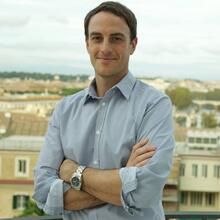A Reflection for Thursday of the Twenty-seventh Week in Ordinary Time
You can find today’s readings here.
I tell you, if he does not get up to give him the loaves because of their friendship, he will get up to give him whatever he needs because of his persistence. (Lk 11:8)
As I get older, one of the greatest challenges to my spiritual life is complacency. I’ve changed a lot over the years, but in many ways it doesn’t feel like my faith has changed much at all. At times it feels stagnant. I feel a kind of worldly pressure to make progress, but that only exacerbates the problem.
I was raised Catholic, went to Catholic schools, studied theology, and have worked in Catholic media for over a decade. My knowledge and wisdom about the church and our faith has developed. Over time I’ve grown and matured. Has my spiritual life grown along with me?
I think one of the reasons we become complacent about our faith is because the spiritual scaffolding around us is fairly constant and unchanging. Every Sunday we go to Mass and recite the same prayers. Before every meal we pause and give thanks using the same formula.
On one occasion, a friend of mine who is not Catholic came to Mass with me and was “weirded out” (her words) by the congregation's recitation of the Creed. It was “cultish,” she said, not because we professed common beliefs, but because of the way everyone robotically recited it. It immediately brought to mind Pope Francis’ warning that, “it is one thing to recite the Creed from the heart and quite another to recite it like a parrot.”
In Luke’s Gospel Jesus says to his listeners, “Ask and you will receive; seek and you will find; knock and the door will be opened to you.” Persist. This comes immediately after the disciples asked Jesus to teach them how to pray and he recited, for the first time, the “Our Father”––“The Lord’s Prayer.”
Like the Creed, the Our Father prayer suffers from our robotic recitation. Or does it? Perhaps Jesus’ encouragement to persist, to keep going, to keep knocking gives our habituated prayers an inherent value that transcends our fickle self-judgements about progress and complacency. Of course, we should avoid reciting the Creed and Our Father like parrots, but we should also take consolation in the fact that Jesus acknowledged how difficult prayer is, and blessed the very act of repetition. The next time you recite a familiar prayer, remember that the act itself is another step toward the Father.








